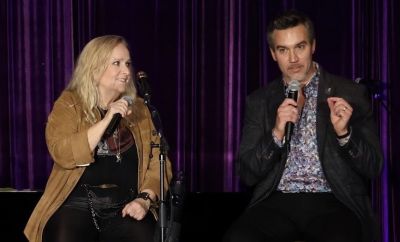With dual training in clinical psychology and neuroscience, Dr. Christopher Nicholas’s career has focused on unraveling the complexities of trauma, addiction, and mental illness. Today, his groundbreaking work in psychedelic science makes him a leading voice in a rapidly evolving field that’s redefining therapeutic possibilities.

Christopher Nicholas, PhD (right), joins Melissa Etheridge onstage at Rock Jam in Newport Beach, California. Nicholas is a scientific advisor to the Etheridge Foundation, a nonprofit organization supporting groundbreaking research into plant-based and psychedelic therapies for opioid use disorder. Photo credit: Carlos Puma
Now a researcher in the UW Department of Family Medicine and Community Health and a core faculty member of the UW Addiction Medicine Fellowship, Nicholas began his career in the U.S. Department of Defense and the U.S. Department of Veterans Affairs (VA). There he studied the long-term effects of traumatic brain injury (TBI) and post-traumatic stress disorder (PTSD). “I was fascinated by how these conditions shape brain health and aging,” he recalls. That fascination soon expanded into a deeper curiosity about psychedelics—compounds like psilocybin and MDMA—which early studies suggested could produce unusually robust and durable therapeutic effects when paired with psychological support.
But for Nicholas, psychedelics weren’t just promising treatments, they were also scientific tools. “They allow us to ask fundamental questions about the mind, brain, and consciousness,” he says. Those questions continue to guide his research today even though it’s not always easy.
“One of the biggest challenges has been navigating the regulatory landscape around Schedule I substances,” Nicholas explains. Slow-moving approvals and limited federal funding have historically hampered progress, though agencies like the National Institutes of Health and VA are now supporting psychedelic research, and public perception is evolving.
Still, Nicholas cautions against extremes. “There’s a misconception that these compounds are either dangerous or miracle cures. Neither is true. Our job is to educate, to be transparent, and to help people understand both the promise and the limitations.”
Nicholas believes the next half-decade will be transformative. “I think we’ll see compounds like MDMA and psilocybin reach FDA approval and begin integrating into mainstream health care,” he predicts. But he’s quick to emphasize the need for thoughtful implementation that prioritizes safety, equity, and access.
His own role involves leading clinical trials, developing credentialing frameworks for clinicians, and exploring how these therapies can be matched to individual needs. “We’re not just treating illness,” he says. “We’re exploring human potential.”
Recently, Nicholas was accepted into the Johns Hopkins Carey Business School Executive Education certificate program sponsored by the National Institute on Drug Abuse, an opportunity he never expected. “I was always focused on biology and clinical science,” he says. “But as I got involved in phase III trials and FDA reviews, I realized how crucial it is to understand the business and regulatory side.”
The program equips addiction scientists with entrepreneurial skills to scale discoveries. For Nicholas, it’s a chance to bring a novel implementation framework into addiction clinics.
As his career progresses, one thing is clear: Nicholas’s commitment to veterans runs deep. As a founding scientific advisor to VALOR (Veteran Alliance for Leadership, Outreach, and Recovery), he’s helping shape strategies for safe access to psychedelic-assisted therapies. “Veterans carry a heavy burden of PTSD, TBI, and suicide,” he says. “They’ve also been some of the strongest voices calling for innovation.”
He sees psychedelics as especially promising for group-based models of care, enhancing trust and connection. “The VA has the infrastructure to lead this next step,” he notes, pointing to emerging evidence in PTSD, addiction, depression, and even chronic pain.
Nicholas’s work also intersects with public advocacy. As a scientific advisor to the Etheridge Foundation—founded by musician Melissa Etheridge after losing her son to opioid overdose—he helps guide research funding for plant-based and psychedelic therapies for opioid use disorder. “We focus on studies that minimize barriers and prioritize real-world implementation,” he says.
At a recent event called Rock Jam in Newport Beach, California—featuring performances by Etheridge, Ashley McBryde, and Hugh Jackman—Nicholas spoke on behalf of the Etheridge Foundation to help bridge the gap between scientific research and public awareness of novel treatments. “Events like this break down stigma and build shared understanding,” he says. “They remind us that healing is not just clinical—it can be cultural, spiritual, and communal.”
Learn more about organizations that support opioid use disorder research:
VALOR: https://supportvalor.org/
Etheridge Foundation: https://www.etheridgefoundation.org/
Johns Hopkins University I4SUD program: https://i4sud.com/
Published: November 2025
